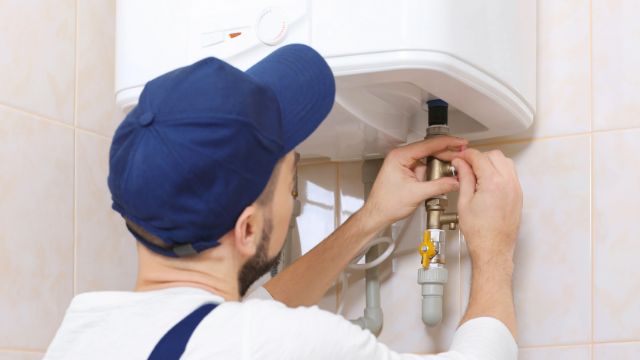A broken geyser or water heater can be very inconvenient, especially when it’s chilly outside. Your geyser might not be functioning properly for several reasons. Here, let’s discuss these problems and offer solutions to assist you in identifying and resolving the issue.
Reasons Water Heater Not Working

1. Power Supply Problems
Reason: Lack of power supply is the most frequent cause of a geyser not working. It might be the result of a blown fuse, unplugged cord, or even a tripped circuit breaker.
Fix: Look for a tripped breaker in your home’s electrical panel and reset it when necessary. Fuse any blown ones. Make sure the switch is turned on as well as the geyser is correctly hooked in.
2. Thermostat Issues
Reason: Your geyser might not heat the water to the right degree when the thermostat is broken or improperly set.
Fix: Review the thermostat settings and make any necessary adjustments. When the thermostat is broken or not working properly, think about getting a new one.
3. Sediment Build-up
Reason: Over time, silt might build up at the geyser’s tank bottom, decreasing its heating effectiveness and perhaps resulting in damage.
Fix: Drain and flush the tank to get rid of accumulated silt. For further information on how to do this, consult the owner’s manual for your geyser. It is often advised to perform this once a year.
4. Pressure Valve Problems
Reason: The safety device known as the pressure relief valve lets off extra pressure. It can prevent the geyser from working properly if it is leaking or not working properly.
Fix: The pressure relief valve might need to be replaced if water is dripping from it. For proper maintenance or replacement, speak with a qualified technician or the manual for your geyser.
5. Insufficient Hot Water
Reason: Your geyser may be having problems with the heating element or a broken thermostat if it is generating less hot water than normal.
Fix: Check the heating element for rust or evidence of damage. Substitute it if it is broken. Make that the thermostat is also adjusted to the appropriate temperature.
6. Water Quality
Reason: High mineral content in hard water might cause the heating element to accumulate scale and lose efficiency.
Fix: To treat hard water and lessen mineral deposits, install a water softener. To avoid scale buildup, clean the heating element frequently.
7. Leaks
Reason: Any leak in the geyser tank or pipelines could cause damage and result in a lack of hot water.
Fix: Check for leaks in the pipes and tank. If you discover any, get the broken parts fixed or replaced by a plumber.
8. Age of the Geyser
Reason: Age tends to reduce geyser efficiency, and older units may have more problems regularly.
Fix: It could be time to think about switching to a newer, more energy-efficient geyser when it’s old and having a lot of issues.
9. Gas Supply Issues (Gas Water Heaters)
Reason: Gas water heaters depend on a consistent supply of either propane or natural gas. The geyser won’t light up when the gas supply is cut off.
Fix: Verify that the gas supply valve is fully open. Contact a qualified gas expert if you believe there may be a leak or if you are having trouble locating a gas supply.
10. Pilot Light Problems (Gas Water Heaters)
Reason: A pilot light lights the primary burner in gas water heaters. The geyser won’t heat water when the pilot light is out or damaged.
Fix: Relight the pilot light according to the manufacturer’s instructions. If it keeps going out or doesn’t stay lit, it might need professional cleaning or maintenance.
12. Faulty Heating Element (Electric Water Heaters)
Reason: A shortage of hot water can result from the heating element within electric water heaters wearing out or burning.
Fix: Disconnect the geyser’s electricity, empty the tank, and swap out the broken heating element. For assistance with this task, consult the geyser’s handbook.
13. Corroded Anode Rod
Reason: Over time, the sacrificial anode rod within the geyser tank may corrode, which could result in tank rust and decreased heating effectiveness.
Fix: To extend the lifespan and performance of your geyser, check it regularly and substitute the anode rod as necessary, usually every 2 to 5 years.
14. Incorrect Geyser Size
Reason: Your geyser might be unable to supply enough hot water when it is too small for your requirements, particularly at times of peak demand.
Fix: To make sure your geyser can supply your household with the hot water it needs, think about upgrading to one with more capacity.
15. Frozen Pipes (Cold Climates)
Reason: Exposed water lines running to or from the geyser might freeze within cold regions, stopping the flow of hot water.
Fix: To stop your pipes from freezing, insulate or heat them. Carefully defrost frozen pipes to prevent harm.
16. Dirty Air Filters (Tankless Water Heaters)
Reason: Air filters in tankless water heaters are prone to clogging with dust and debris, which lowers performance.
Fix: To maintain best performance, routinely maintain or substitute the air filters in accordance with the manufacturer’s instructions.
17. Electrical or Gas Supply Voltage Fluctuations
Reason: Component damage from voltage swings or surges within the electrical or gas supply can occur.
Fix: To prevent voltage fluctuations from affecting your geyser and maintaining consistent performance, use voltage stabilizers or surge protectors.
18. Manufacturer-Specific Issues
Reason: Some geyser models could have particular problems or features that call for expert troubleshooting.
Fix: For assistance with resolving model-specific difficulties, consult the user manual or get in touch with the manufacturer’s customer care.
Conclusion
Many of these problems can be avoided with routine maintenance, which includes draining the tank, looking for leaks, and keeping an eye on the thermostat settings. An expert plumber or electrician can do a comprehensive assessment and any required repairs when you’re unsure of the source of your geyser’s problem or uncomfortable performing repairs yourself.

Santosh Kumar is an editor at unfoldstuffs.com and a professional content writer. With years of experience he is passionate for creating engaging, informative and impactful topics.









